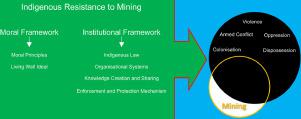The Extractive Industries and Society ( IF 3.6 ) Pub Date : 2021-07-12 , DOI: 10.1016/j.exis.2021.100953 Diana Carolina Arbeláez-Ruiz 1

|
Indigenous peoples’ relationship with mining involves tensions and conflicts that intensify in armed conflict and post-conflict environments. Studies of the intersection between mining, armed conflict and post-conflict peacebuilding portray Indigenous people as passive recipients post-conflict natural resource governance interventions. This paper challenges that perspective by demonstrating the active, highly organised and complex roles Indigenous people play in mineral resource governance in a post-agreement environment. Despite Colombian government interest in positioning high value mineral resource extraction as a platform for prosperity and peace, illegal gold mining has become a central source of finance for violent armed groups, and legal mining has been linked to threats to Indigenous rights. Many Indigenous communities in Colombia oppose mining. This paper examines Indigenous participation in natural resource governance concentrating on the resistance to certain forms of mining by the Nasa Indigenous people of North Cauca. It is based on an interpretative, layered ethnographic case study comprising archival research, interviews, and participant observation across various Nasa organisational and territorial domains. I find that the Nasa build on their strong moral and institutional frameworks for resistance to structure and implement a response to mining. I illustrate the Nasa's determinant role in post-conflict mining governance, as well as the moral tensions and dilemmas, and the risks the Nasa face in responding to mining in a violent context.
中文翻译:

冲突后哥伦比亚土著人对采矿的抵制
土著人民与采矿的关系涉及在武装冲突和冲突后环境中加剧的紧张局势和冲突。采矿、武装冲突和冲突后建设和平之间的交叉研究将土著人民描绘为冲突后自然资源治理干预措施的被动接受者。本文通过展示土著人民在协议后环境中在矿产资源治理中所扮演的积极、高度组织化和复杂的角色来挑战这一观点。尽管哥伦比亚政府有兴趣将高价值矿产资源开采定位为繁荣与和平的平台,但非法采金业已成为暴力武装团体的主要资金来源,合法采矿与对土著权利的威胁有关。哥伦比亚的许多土著社区反对采矿。本文考察了土著参与自然资源治理的情况,重点关注北考卡的美国宇航局土著人民对某些形式的采矿的抵制。它基于一个解释性的、分层的民族志案例研究,包括档案研究、访谈和跨美国国家航空航天局各个组织和领土领域的参与观察。我发现美国国家航空航天局建立在他们强大的道德和制度框架之上,以抵制结构和实施对采矿的回应。我说明了美国宇航局在冲突后采矿治理中的决定性作用,以及道德紧张和困境,以及美国宇航局在应对暴力环境中的采矿时面临的风险。本文考察了土著参与自然资源治理的情况,重点关注北考卡的美国宇航局土著人民对某些形式的采矿的抵制。它基于一个解释性的、分层的民族志案例研究,包括档案研究、访谈和跨美国国家航空航天局各个组织和领土领域的参与观察。我发现美国国家航空航天局建立在他们强大的道德和制度框架之上,以抵制结构和实施对采矿的回应。我说明了美国宇航局在冲突后采矿治理中的决定性作用,以及道德紧张和困境,以及美国宇航局在应对暴力环境中的采矿时面临的风险。本文考察了土著参与自然资源治理的情况,重点关注北考卡的美国宇航局土著人民对某些形式的采矿的抵制。它基于一个解释性的、分层的民族志案例研究,包括档案研究、访谈和跨美国国家航空航天局各个组织和领土领域的参与观察。我发现美国国家航空航天局建立在他们强大的道德和制度框架之上,以抵制结构和实施对采矿的回应。我说明了美国宇航局在冲突后采矿治理中的决定性作用,以及道德紧张和困境,以及美国宇航局在应对暴力环境中的采矿时面临的风险。分层的民族志案例研究,包括档案研究、访谈和跨美国国家航空航天局各个组织和领土领域的参与观察。我发现美国国家航空航天局建立在他们强大的道德和制度框架之上,以抵制结构和实施对采矿的回应。我说明了美国宇航局在冲突后采矿治理中的决定性作用,以及道德紧张和困境,以及美国宇航局在应对暴力环境中的采矿时面临的风险。分层的民族志案例研究,包括档案研究、访谈和跨美国国家航空航天局各个组织和领土领域的参与观察。我发现美国国家航空航天局建立在他们强大的道德和制度框架之上,以抵制结构和实施对采矿的回应。我说明了美国宇航局在冲突后采矿治理中的决定性作用,以及道德紧张和困境,以及美国宇航局在应对暴力环境中的采矿时面临的风险。











































 京公网安备 11010802027423号
京公网安备 11010802027423号